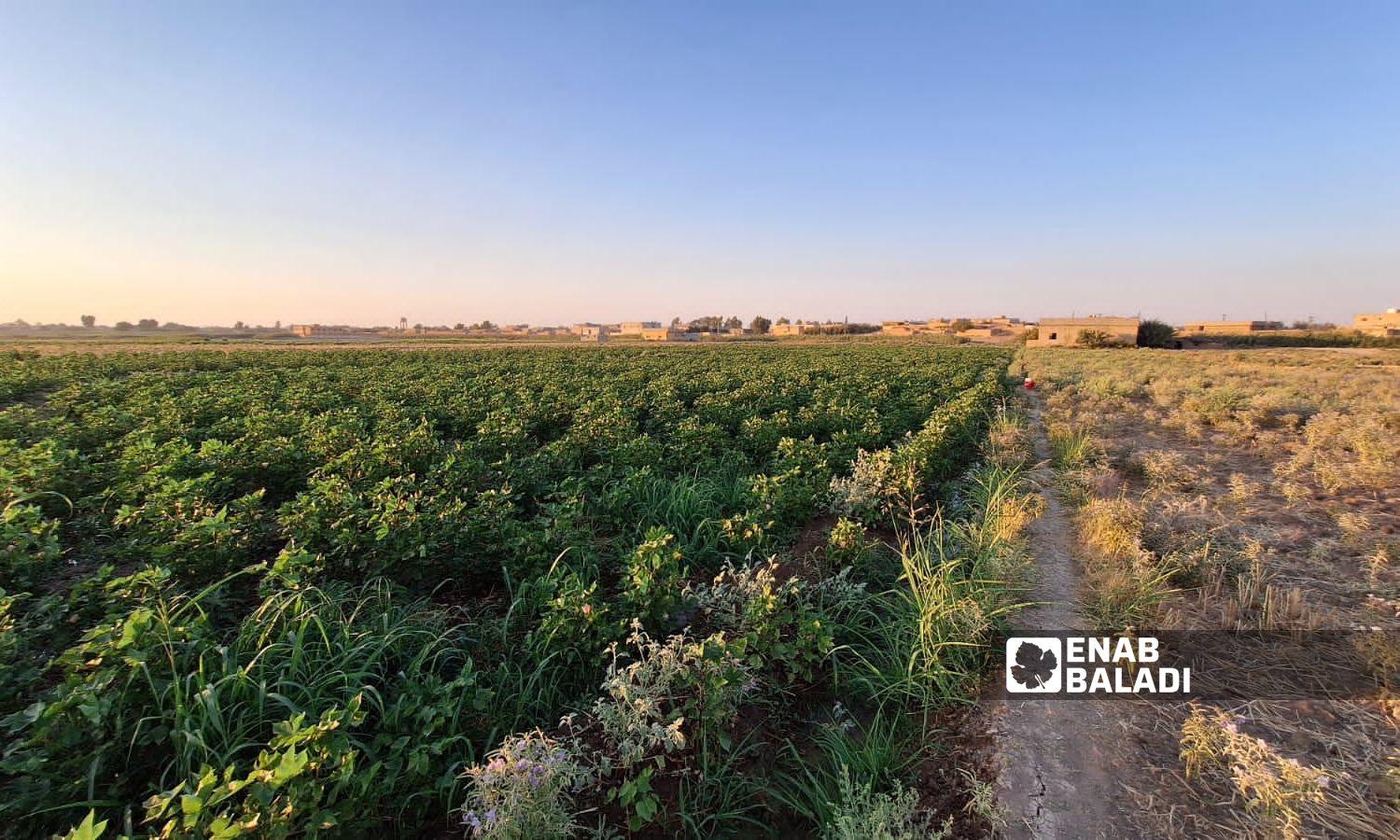



Deir Ezzor – Obadah al-Sheikh
Since the start of the military escalation between the Syrian Democratic Forces (SDF) and tribal groups accused of receiving support from the regime and Iran, in the eastern countryside of Deir Ezzor, the region’s farmers have been restricted from accessing their lands, causing them severe losses.
In areas where military confrontations have been concentrated on the western banks of the Euphrates River, where regime forces are stationed, and the eastern banks where the SDF is located, agricultural lands are prevalent, and their owners suffer from being prevented from practicing their work, even after the confrontations have calmed.
Majid al-Farash, a farmer in the town of Buqras in eastern Deir Ezzor west of the Euphrates River, was prevented from accessing his land adjacent to the Euphrates River, which is planted with cotton, despite the approaching harvest season.
Al-Farash told Enab Baladi that his crop needs watering and care, and he expects significant losses after more than a week of being prevented from visiting his crop.
He added that he did not expect to be barred from visiting his land for a long time, as the last irrigation he conducted was on August 5, just two days before the confrontations began. It has been 11 days without watering the crop, which requires a lot of water under normal conditions.
Farmer Mohammad al-Kasem (55 years old) said to Enab Baladi that locals are the biggest losers, especially after most of the work ceased due to a curfew imposed in the area in the wake of the escalation.
Al-Kasem said he owns a 35-dunam cotton farm that has needed watering for days, but he has not been able to reach it, indicating that his crop for this year is at risk of spoiling, especially since it has not been watered for more than 15 days, knowing that the crop needs watering within a maximum period of ten days.
Eastern Deir Ezzor areas rely on agriculture, and the cultivated areas are concentrated near the Euphrates River due to the abundance of water.
Farmers interviewed by Enab Baladi believe that preventing access to their agricultural lands has caused them significant losses and harmed their interests, especially as life is almost paralyzed in the eastern Deir Ezzor countryside due to the large displacement of residents.
Several summer crops have been damaged due to the mutual shelling and preventing farmers from accessing them, most notably tomato, cucumber, and eggplant crops, which require regular watering and daily labor to inspect them.
Farmers from the eastern Euphrates areas believe there is no hope of saving their crops this year.
Imad al-Fawaz, a farmer from the town of al-Sabha in eastern Deir Ezzor east of the Euphrates River, told Enab Baladi that the military points belonging to the SDF near the Euphrates River have prevented him and the owners of lands near the river from watering and accessing their lands since the escalation began in Deir Ezzor. If the decision is violated, the farmer is at risk of being shot on the pretext of infiltrating across the river.
Farmer al-Fawaz mentioned that he will not be able to water his land at present, noting that agriculture is his family’s main source of income.
Farmers cannot reach their lands near the Euphrates River due to snipers on both sides targeting anyone approaching the river.
Recently, the pace of shelling and mutual clashes between militias affiliated with the regime forces and SDF has increased, resulting in civilian casualties and material losses, and infrastructure damage suffered by the residents of the area.
The military escalation has led to mass displacement of residents, particularly in the towns of al-Sabha, Abu Hamam, Dhiban, al-Basira, and al-Dahla, following regime shelling on these areas that left 11 civilian victims in al-Dahla.
The United Nations Office for the Coordination of Humanitarian Affairs (OCHA) commented on the clashes in Deir Ezzor in eastern Syria, which affected the delivery of essential assistance and services to civilians in Deir Ezzor and al-Hasakah provinces.
An OCHA report on August 14 mentioned that Deir Ezzor has witnessed intense clashes and sniper operations, resulting in the killing of at least 25 civilians, injuring others, and displacing large numbers.
The closure of the Euphrates crossing and the clashes have “severely” restricted civilians’ access to essential services and humanitarian aid, significantly limiting access to healthcare, water, and food, causing prices to rise and exacerbating the harsh living conditions.
Despite recent positive developments, significant challenges remain, and humanitarian workers face movement restrictions, hindering the timely delivery of humanitarian aid to over 100,000 people already suffering from the harsh summer conditions, according to the report.
OCHA called on the parties to take all necessary measures to protect civilians, civil infrastructure, and humanitarian operations, in accordance with international humanitarian law and human rights law, and to ensure immediate, safe, and sustained access to humanitarian aid for all those in need.
if you think the article contain wrong information or you have additional details Send Correction